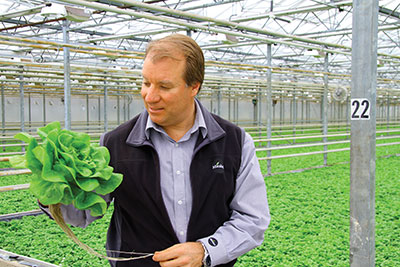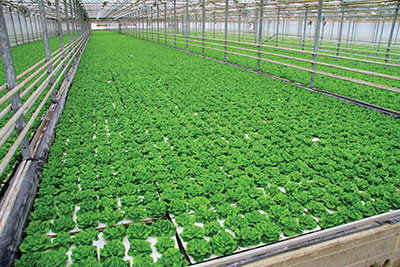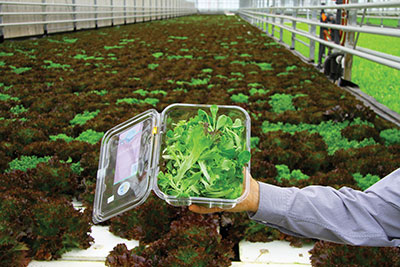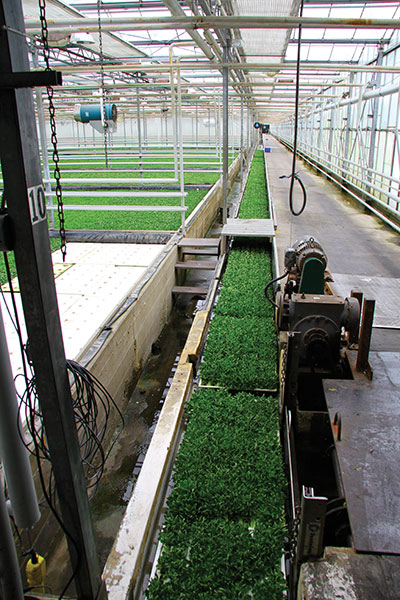
To the visitor, the picture is intriguing: a carpet of mache lettuce,
floating peacefully on Styrofoam rafts barely visible between bunches of
tiny leaves.
To the visitor, the picture is intriguing: a carpet of mache lettuce, floating peacefully on Styrofoam rafts barely visible between bunches of tiny leaves.
 |
|
| Sylvain Terrault, with Boston lettuce, the company’s primary product. Advertisement
|
To owner Sylvain Terrault, this picture is the perfect metaphor. The waters had been quite unsettled at Hydroserre Mirabel for a few years while dealing with a number of challenges.
It has now been 25 years since Hydroserre Mirabel first brought greenhouse Boston lettuce to the retail market using a revolutionary hydroponic technology. There were times of amazing success, growth pains and ownership shuffles, and a devastating disease outbreak.
With all that behind it, the company is now focusing again on growth.
In 2008, Terrault bought out his partner, Martin Desrochers, and became the sole owner of North America’s leading producer of greenhouse lettuce. The Mirabel brand is strong, but production for a time was plagued by a mysterious strain of phytophthora.
Terrault took matters into his hands, determined to continue the venture he had dedicated most of his adult life to.
MÉRITAS GILLES-BORDELEAU AWARD RECOGNITION THIS YEAR
■ This determination, along with extensive involvement in grower organizations, was recently recognized when the Conseil québécois de l’horticulture (Quebec Horticulture Council) and the Syndicat des producteurs en serre du Québec (Greenhouse Growers’ Union) awarded him the Méritas Gilles-Bordeleau.
Greenhouse Canada met with Terrault at his five-hectare hydroponic facility near the Mirabel airport, north of Montreal. Production also takes place on 1.5 hectares in two other sites in Quebec, as well as on three hectares at Serres Lefort, Quebec’s largest propagator. Total production is 12 million Boston lettuce heads each year, along with 100,000 kilograms of mache lettuce.
Hydroserre Mirabel was started by the Desrochers family in 1988. Terrault was involved from the start, working for a real estate investment firm that owned 70 per cent of the shares. Fresh out of university, Terrault got to work helping them improve profitability.
In 1991, Terrault’s employer sold its shares to a Dutch investor, who decided to part with them in 1994. Terrault had at the time recently resigned when he got a call from founder Luc Desrochers, asking him to work full time at the greenhouse.
Terrault accepted the offer, on the condition he could become a partner. He started his new job with 2.5 per cent of the shares.
A deal was soon reached with the Fonds de solidarité FTQ (a union investment fund), which acquired 70 per cent of the shares.
YEARS OF STRONG GROWTH SPURRED BY NEW U.S. MARKETS
■ During the following years, Hydroserre Mirabel expanded its operations, taking advantage of the weak Canadian dollar to increase sales in the Unites States. Major outlets like Shaw’s, Hannaford and Costco appreciated the uninterrupted supply of quality Boston lettuce. The product remained a niche item, but one that retailers could rely on year-round.
 |
|
| The company has long been a leading greenhouse lettuce grower, especially of Boston lettuce.
|
Desrochers headed Hydronov, a division that exported the hydroponic technology worldwide. His brother Martin was president and Terrault was vice-president, in charge of operations and finances.
‘‘The U.S. market was opening up to us, the Canadian dollar allowed us to make great profits and we built a new greenhouse in Mirabel. By 2002, with almost 800,000 square feet of production, we had the largest greenhouse complex in Quebec,’’ said Terrault.
With 50 per cent more production, growth pains developed. Selling so much more lettuce could not be achieved instantly. The Fonds de solidarité FTQ was looking for better returns and did not want to remain a majority shareholder. A new ownership deal was reached: Luc Desrochers took off on his own with Hydronov, with his brother Martin and Terrault each acquiring 35 per cent of the shares of Hydroserre, leaving 30 per cent to the union investment fund.
In the following years, demand in Eastern Canada and New England kept Hydroserre Mirabel in expansion mode. Costco U.S. wanted more and more Mirabel lettuce. Space was rented at Rose Drummond, in greenhouses that would have otherwise been demolished.
In 2006, Martin Desrochers and Terrault bought the remainder of shares and became equal partners. The strong position on the U.S. market attracted the eye of lettuce giant Tanimura & Antle (T & A). A team flew to Mirabel to present the company’s vision and a partnership offer.
T & A aquired 50 per cent of Hydroserre Mirabel in 2007. Hydronov was mandated to build a hydroponic greenhouse in Tennessee. However, just before the transaction, T & A was made aware that a new, unexplained plant health issue had popped up in Mirabel.
And then the 2008 recession struck.
‘‘We had been operating for 20 years with no major problem and all of a sudden, roots were dying and our lettuce didn’t grow,’’ Terrault recalls.
MYSTERY PLANT DISEASE THAT STYMIED EXPERTS WORLDWIDE
■ Water samples were sent to university labs. Experts from New Zealand, Great Britain and the United States were flown in. ‘‘We called in PhDs in agronomy, vegetal biology and chemistry. We looked everywhere for the cause. We even suspected the deicing fluid used on aircraft wings.’’
 |
|
| Major markets include Boston, Chicago, New York, Philadelphia, Washington, Montreal, Quebec City, Ottawa and Toronto.
|
With no banker wanting to lend them money, construction in Tennessee was stalled. Production in Mirabel was in jeopardy. T & A left the partnership, taking with it the Tennessee site. Hydroserre Mirabel had given birth to its biggest competitor.
In October 2008, Terrault bought out Martin Desrochers and became sole owner. ‘‘I had the feeling I wasn’t done with Mirabel. I couldn’t let go of all the efforts and investments we had made in this company. We had a strong disease issue, but I was convinced we would find a solution.’’
The mysterious disease remained, even after a number of shutdowns and cleanups that cost the company millions of dollars. Production had become impossible during the summer months. Terrault decided that if the problem could not be solved, they would have to work around it.
There would be no more marketing in the summer to keep up with competition from field lettuce. In 2009, a one-hectare greenhouse was purchased in Ham-Nord, 200 kilometres southeast of Montreal. The site is in the middle of the woods. Terrault is the only one from Mirabel authorized to visit.
In 2010, a partnership was established with Serres Lefort, in which 1.4 hectares of Boston lettuce is grown on contract. Hydroserre Mirabel is now again able to supply its clients throughout the summer, despite a three-month production halt at its main complex.
Terrault suspects the disease strain to be exotic. How it made its way to Mirabel remains unknown. But two facts are clear: it only thrives in the summer and it only affects lettuce. Other vegetables, such as bok choy, cauliflower and herbs, do exceedingly well in Hydroserre Mirabel’s hydroponic system.
MACHE LETTUCE FIRST STEP IN COMPANY’S DIVERSIFICATION
■ Diversification is now the name of the game. Mache lettuce is the first step, and already it is finding its way into the retail stream. There will soon be many other products sold under the Mirabel brand, Terrault promises.
 |
|
| Rafts of lettuce being floated towards the shipping department.
|
‘‘Our brand is strong and our clients appreciate us. We ship 12 months a year and we are there when clients need to double their orders because lettuce production in California runs into trouble. This gives us a lot of credibility.’’
Projects on the table could boost annual turnover to some $30 million.
Diversification and possible acquisitions don’t stop Terrault from remaining involved in grower organizations.
‘‘With our disease problems, people thought our company would die. I want to show that we are still there. We are a major player in the greenhouse industry and I want to contribute to improving our industry’s position.’’
Terrault believes strongly in increasing the amount of Quebec-grown produce on supermarket shelves. He appears with his lettuce on giant ‘‘Aliments du Québec’’ posters.
ONCE AGAIN A GROWING FAMILY OPERATION
■ It has been 25 years of ups and downs, but what was at first a family startup is once again a family affair.
Terrault’s wife, Chantal Desjardins, is now working full time in charge of finance and administration. His brother, Daniel, is now vice-president in charge of marketing and business development.
His daughter Valérie is studying communications and his son Simon is in business school. Both are showing interest in the company.
André Dumont is a freelance writer and photographer in Quebec.
Print this page